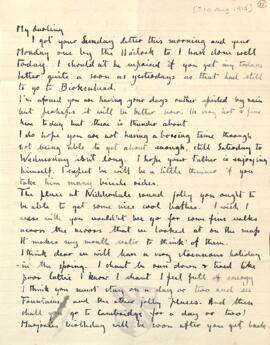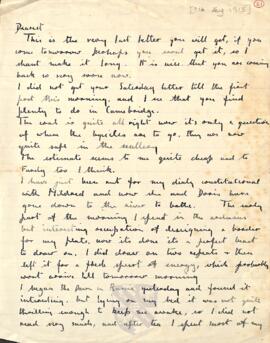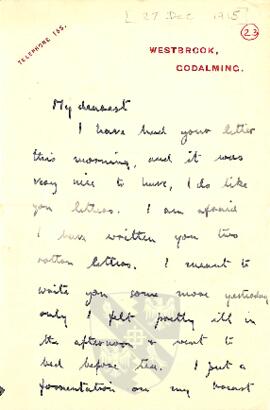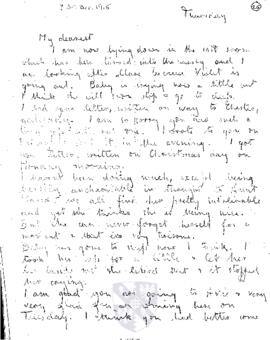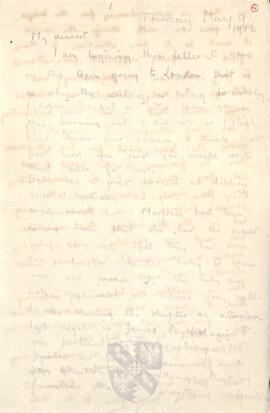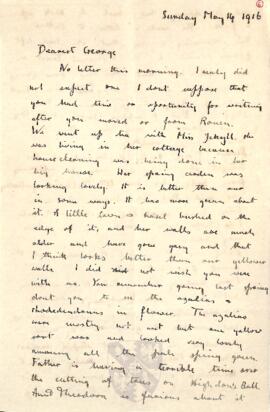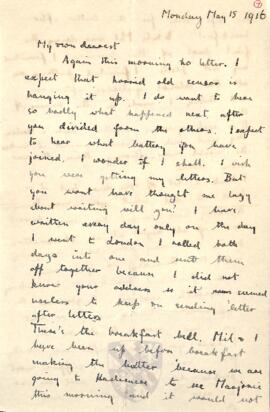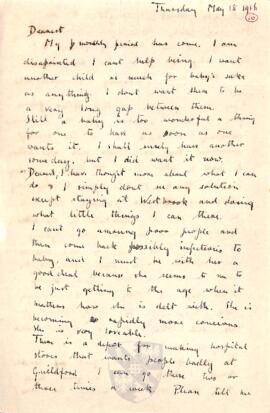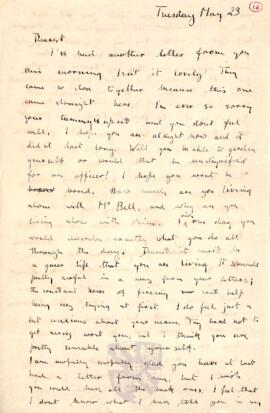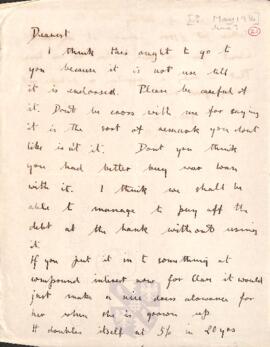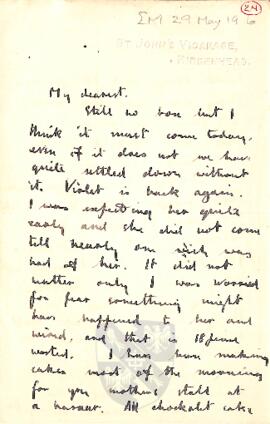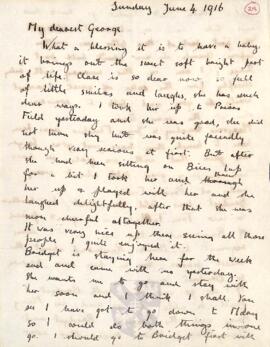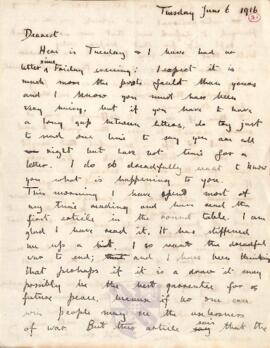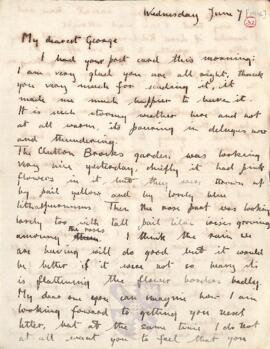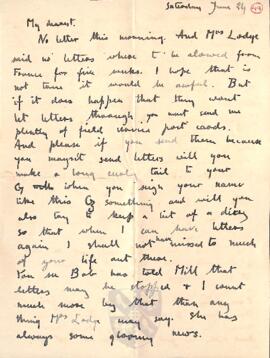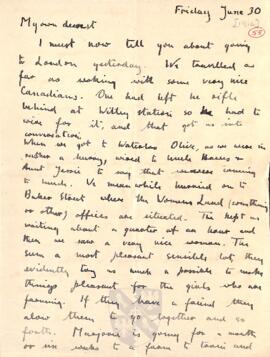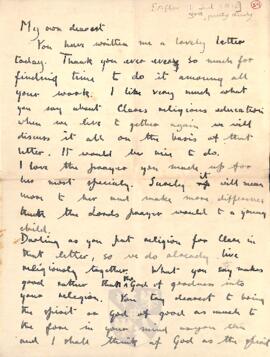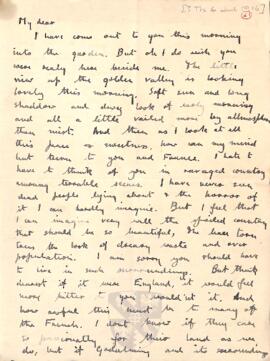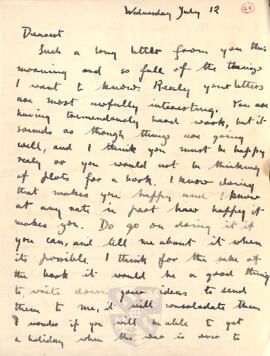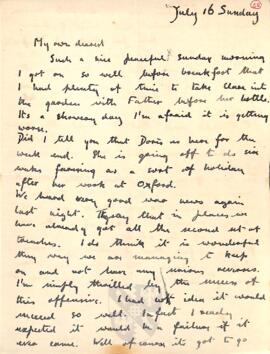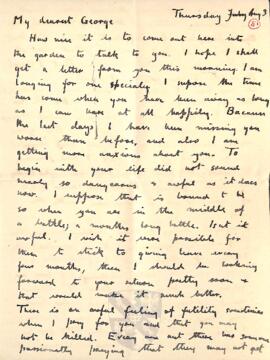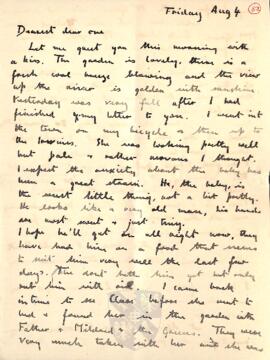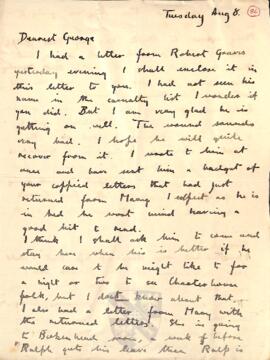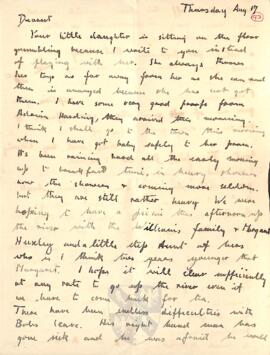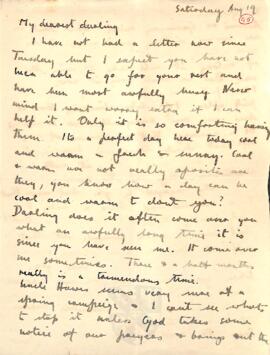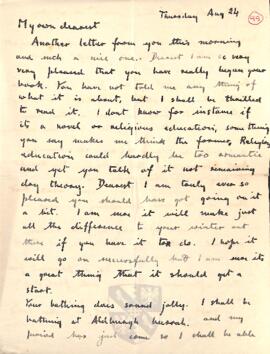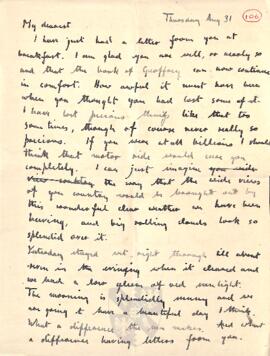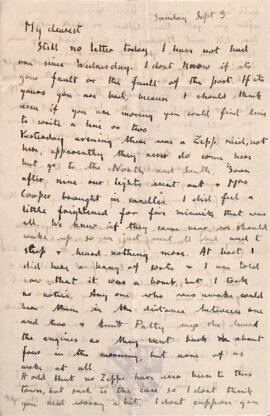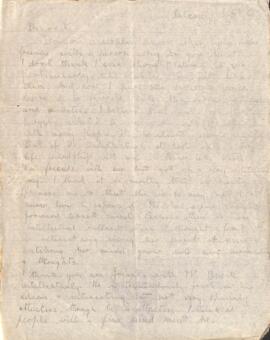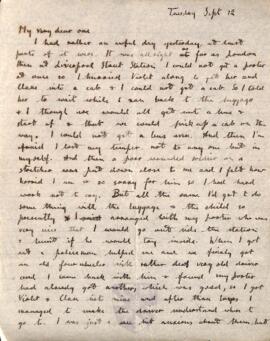Praises the quick postal service and hopes he is having a nice time with his father, despite the bad weather. Expresses her wish to be there. Encourages him to stay longer and look for a present for Marjorie’s birthday. Tells him of her morning activities; having her hair washed and china painting. Asks about the date for Trafford’s wedding. Discusses how they intend to educate their children. Tells him her father, Mildred and Major Morgan have gone fishing at Eut
She has received his letter and looks forward to his return. Discusses the question of where to keep the bicycles. Describes her morning activities: walking and designing plates. Gives her opinions on the Dawn of Russia.
Is happy to have received his letters. Expresses her views on the meaning of love. Hopes that they will have more children and tells him of Clare’s progress.
Is glad he received her letter. Describes her morning with Clare. Is glad he is coming home and asks what train he is to arrive on. Informs him that Bob [Major Robert Morgan, husband of Ruth sister Mildred] is due to arrive in London. Expresses her wish to live closer to Weymouth while he is there.
Is writing to him from the train to London. Tells him Marjorie took Clare to the hospital to show her off. Discusses the book she is reading on psychology. Asks him to date his letters. Wonders if he has received her letters yet through the Poste Restante Honfleur. Hopes that he will get the guns he likes. Informs him that Ursula Nettleship is expected to visit. Tells him how Mildred was robbed in London. Describes fabric she intends to use to make two dresses. Informs him she intends to stay at Birkenhead for a fortnight. Tells him of the china and earthenware she bought from Wedgewood wholesale. Hopes he is getting on well and that she has sent his pillowcases.
Describes Miss Jekyll's garden. Tells him of a feud between her father and Aunt Theodora over the cutting of some trees on Highdon's Ball. Hopes he is not staying anywhere infested with rats. Discusses what she has been reading in Vanity Fair. Is glad that he is going to tell her more details of the war. She intends to have the Clutton-Brocks over to stay. Wishes him luck with his new Battery.
Asks what happened to him when separated from the others. Hopes her letters are getting through. Describes her morning activities - making butter and china painting. Wonders what he is doing and hopes the war will be over soon. discusses her opinions on a business government. Describes her shopping trip to Hazelmere. Asks him if he has seen any of the action from the front. She intends to write to Avie and send her some of his letters.
Informs him that she is not pregnant. Expresses her wish to have more children. States that she cannot help at the hospital for fear of passing infections to the baby. She intends to stay with Avie in the week. Relays Mr Reade's compliments on his pamphlet. Expresses her concerns about the war and his safety. Tells him she has sent him his protractor.
Asks him what his living conditions are like with Mr Bell. Expresses her concerns over his safety. Informs him she has sent him letters from Mr Benson and Mr Earl. Describes her day and intention to see Nancy Warr in Liverpool. She is glad Violet will not leave to join a munitions factory. Describes how busy his father is. Asks him for more information about climbing the chimney. Tells him she will send him cake when she gets home.
Discusses the idea of investing money at compound interest for Clare's future.
Informs him her box is still missing and Violet has arrived back from her trip. Tells him of the cakes she has made for his mother’s bazaar stall. Describes her activities with Clare in Birkenhead. Discusses her opinions on the sermon his father gave in Church and the National Mission of Repentance and Hope. Wonders how his boots are holding up with all the walking. Asks him what Captain Matheson is like and how his work is going. Tells him she misses him and informs him she intends to see Marjorie that day.
Morning - Describes her visit to Prior's Field with Clare. Informs him that Bridget is visiting and intends to stay with her soon.
Afternoon - Describes her lunch with Marjorie Huxley and Joyce Fletcher. Intends to visit Mary Anne and the Reades. Expresses her fears for his safety and talks about life after the war. Tells him about the prayers at Church for those at sea. She intends to keep herself busy over the summer.
Hopes that he is well as she has not heard from him in a few days. She has been reading the Round Table. Expresses her views on how the war could come to an end through the application of an international law. Asks for his opinion about the end of the war. Describes her feelings towards Polly. Tells him about the tea service she is making. Describes her evening activities, singing and playing the piano. Expresses her wish to buy a new piano for the Holt after Polly takes the one there when she leaves. She has asked for clothes for her birthday present. Asks him if he knows Sibel Cropper, an old school friend of Marjorie’s. Recounts the story of Sibel refusing to marry Geoffrey Young and asks if he discusses Geoffrey’s love affairs with Mr Reade.
Is glad she has heard from him. Describes the Clutton-Brocks garden. Discusses the possible repercussions of Lord Kitchener's death. Tells him Mr Brock intends to send him his book. Updates him on Clare's progress. She has heard about Mr Kendal from Mr Brocks regarding the headmastership. Intends to take a trip to London.
Expresses her concern that letters from France may be stopped; requests that he keep a diary if so. She has sent him May and June issues of The Times and asks if he would like the New Statesman. Discusses the location of the Germans to Verdun. Wonders when he will be granted leave and shares her thoughts of women in war. Expresses her wish to have another baby and have Clare to herself without Violet; wonders if she would find it too taxing full time. Describes what life will be like for them after the war.
Morning - Describes her journey to London and tells a story about a Canadian leaving his rifle behind. Describes the women at the Women’s Land offices where Marjorie applied for farm work. Informs him Marjorie has been assigned to a farm owned by Olive’s brother and will stay for 4-6 weeks.
Afternoon – Describes her conversation with Uncle Hawes and Aunt Jessie about their visit to Ogwen Lake. Describes her activities in London; shopping at Wedgwood and Oxford Circus for clothes, tea with Mrs Reade. Describes the relationship between Mr Reade and Owen and expresses her own opinions on the matter. Intends to send Mrs Reade his letters to read. She will thank Mr Clutton-Brock for the book he sent.
Thanks him for his letter and expresses her happiness to hear his thoughts on Clare’s religious education. Discusses her thoughts on religion in relation to the war and how to raise Clare. Expresses her thoughts on life after death and hopes they can discuss these matters together. Discusses the progress of the war. Describes her conversation with Aunt Agnes and Uncle Peter at Roke and discusses their relationship. Hopes that they can make their life perfect. Intends to take tea with Marjorie and Clare at Mrs Brock’s house.
Describes the garden and compares her surroundings to his in France. Tells him she misses him. Expresses her worry about what life might be like after the war and talks of how things should change for the better. Tells him how Violet is ashamed of her tanned skin on return from her holiday. Describes her intended activities; painting china, going to golf with her father. Describes to him Bob’s ill feelings towards his requests for parcels and his opinion of his regiment as a tiresome and difficult one.
Thanks him for his letters and for answering her questions. Is happy that he is planning a plot for a book. Discusses the recent action in the war. Tells him about the meeting of the National Mission and expresses her opinion about appropriate dress in Church. Discusses his opinions on Christianity. Describes her disagreements with Violet over the best way to feed Clare and tells him how Clare wakes up in the mornings. Describes tea with her father and Mrs Green. Revises her opinion of Mrs Green. Informs him she wishes to buy them a piano with the £50 from the sale of the trees from the common. Discusses the trenches in Germany.
Sunday 16 July - Informs him that Doris is visiting from Oxford. Discusses the progress of the war and the news from Mr Powell and Harry that shooting can be heard from London and Dover. Asks him about his companions. Discusses their previous conversation about Christianity.
Monday 17 July – Discusses the progress of the war. Discusses the possibility of peace terms. Relays the situation with the gardening position. Intends to read Boswell’s Life at Johnson and more Shakespeare. Tells him about her dream and longs for the end of the war.
Strongly expresses how much she misses him and worries about his safety. Expresses how she wished she could talk to his friends about him. Describes being her father’s caddy at the golf course. Intends to have tea with Mrs Irvine. Discusses Shakespeare’s Hamlet. She will not send him any butter because of the heat.
Describes the weather and her trip to Mrs Irvine. Updates him on the progress of Mrs Irvine's baby. Describes her father, Mildred and the Greens playing with Clare in the garden. Discusses her opinions of Mr and Mrs Green. Describes the activities she has planned for the day. Tells him she has been instructed to find rooms at Felixstowe for Uncle Lawrence and themselves. Updates him on Clare's progress. Discusses Hamlet. Informs him the electric light is broken. Hopes to get his next letter quickly.
Informs him that Robert Graves has been wounded and she intends to ask him to visit. Tells him that Ralph is to get leave and will go to Birkenhead with Mary. Describes her intended activities for the day. Asks him if he would like some apples to be sent out. Expresses her love for him. Intends to go to Alborough to find lodgings and will start at 8.30 and not get back until after 9.. Updates him on her father's trouble with male staff. Intends to have tea with Mrs Kendell.
Describes Clare playing and the weather. Intends to have a picnic on the river with the Williams family and Margaret Huxley. Tells him about Bob's leave. Discusses his companions and plans to visit French Cathedrals after the war. Discusses her opinions on the anti sweating league and the difficulty of wages. Expresses her anxiety over the war. Asks his opinion of the safety of visiting the East coast. Intends to have Uncle Hawes and Aunt Jessie to visit. Asks him if he attends services on Sundays and if he got the apples.
Describes the weather and expresses her fear of not hearing from him for a few days. Remarks on how long it has been since they saw each other. Discusses the progress of the war. Describes climbing a tree and expresses her opinion on how married women are expected to behave. Tells him Susan the maid is leaving and they will have to make their own beds. Describes the bowl she is working on. Expresses her opinions on Mrs Green's character. Discusses her plans for the garden. Discusses the German failure at Verdun.
Discusses the book he has begun to write. Tells him she intends to go bathing in Aldeburgh. Updates him on Clare's teeth. Discusses Aunt Eleanor's opinions on children being photographed naked. Explains how Adrian Harding used Clare's naked photograph outside his shop at the train station. Updates him on the progress of her bowl. Describes the activities for the day with her father and Mildred. Discusses her book. Expresses her thanks he is out of danger for a time. Discusses the progress of the war.
Discusses his last letter about his book. Describes the weather and the walks around Aldeburgh. Discusses the book she is reading Boswell's Life of Johnson. Asks if he has heard anything from Trafford. Describes their activities. Asks him if he wants more children. Updates him on Clare's progress. Discusses her opinions on raising children.
Tells him off for not writing. Describes hearing a bomb go off in the night from a distance. Expresses her wish to have him home. Describes her trip on the river and walks around the common. Asks him how his Book of Geoffrey is progressing. Expresses her opinions about the German air raids.
Voices her opinions about making friends and how people fall in love. Expresses how much she misses him. Describes listening to a military band. Tells him she has written to his mother, Aunt Jessie and Alison. Describes a trip out in a pony cart.
Describes her difficulties arriving at Liverpool Street in finding a cab and her journey to Uncle Hawes' house. Discusses the Lickfold's upcoming trip to Trinidad. Describes their welcome home by Mildred. Updates him on Clare's progress.
